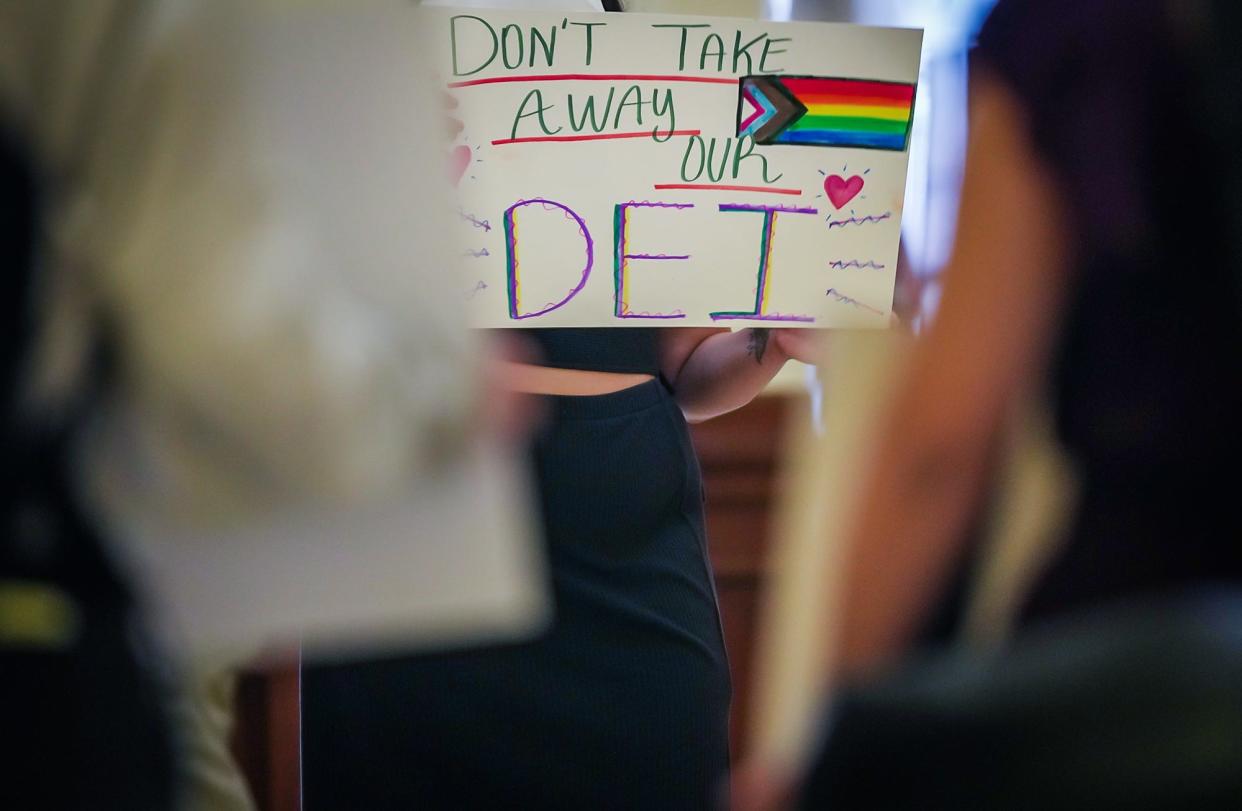UT students see affirmative action ban as another blow to diversity on Texas colleges

After this year's legislative session, some University of Texas students see the U.S. Supreme Court's decision to prohibit the use of race in college admissions as another blow to efforts to maintain a diverse student body within Texas universities.
On Thursday, the Supreme Court ended race-conscious admissions nationwide when it issued its long-expected ruling in separate cases that the conservative nonprofit Students for Fair Admissions brought against the University of North Carolina and Harvard University.
The court found that the admissions systems at both schools violate the equal protection clause of the 14th Amendment. The ruling said schools could still consider an applicant’s discussion of how race affected their life, as long as the discussion is "concretely tied to a quality of character or unique ability that the particular applicant can contribute to the university."
More: U.S. Supreme Court overturns affirmative action. Here's what it means for Texas colleges.
Several UT students told the American-Statesman that they believed considering race in admissions helps diversify their campus, and they are concerned about the future for students of color at Texas colleges because they feel the court's decision will limit opportunities and access to higher education.
"Affirmative action, while it might not be the perfect program to get diversity on campus, ... it does attempt to mitigate years of discrimination or racism that racial and gender minorities have faced in the United States," said William Ramirez, UT's student body vice president. "It just gives them like equal footing of attempting to get a higher education and a better way of life."
The high court's decision comes less than a month after Gov. Greg Abbott signed Senate Bill 17 into law, prohibiting diversity, equity and inclusion offices in Texas public colleges and universities starting in 2024. The new law also bans colleges from requiring anyone to provide DEI statements or participate in DEI training.
Madyson Mireles, former director of the student-run Diversity and Inclusion Agency at UT, said she feels the two developments — the court's ruling and Texas' SB 17 — are part of a related effort to limit campus diversity or diversity efforts in the state's higher education institutions. She said she believes both race-conscious admissions and DEI initiatives help students of color feel included on campus.
More: Many flagship universities don’t reflect their state’s Black or Latino high school grads
"In Texas, we want people of color," said Mireles, a UT student. "We want diverse backgrounds. We want to learn from our peers. We want that diversity on campus, but if there is no diversity, I think my biggest fear is that will go back to the days where it was hard ... for any person of color to go into these spaces and be heard."
The court's ruling came seven years after the nation's highest court upheld the UT's consideration of race in its undergraduate admissions in the Fisher v. University of Texas case. UT successfully argued in the 2016 case that its consideration of race helped the school obtain racial diversity on its campus.
However, unlike major state universities in other states, UT's admissions practices won't be as affected by the most recent ruling striking down the use of race in admissions because the school admits 75% of its freshman class through the top 6% rule, where high school students in the top 6% of their graduating class get automatic admission into the university.
The remaining students are admitted through a holistic review process in which several factors are considered, including race and ethnicity.
“UT will make the necessary adjustments to comply with the most recent changes to the law and remains committed to offering an exceptional education to students from all backgrounds and preparing our students to succeed and change the world,” UT wrote in response to Thursday's ruling.
Several public and private colleges and universities in Texas, including UT, have increased the percentage of students of color in recent years, but few have managed to enroll a student body that reflects the state's demographics, even with the option to consider race in admissions.
More: Texas Gov. Greg Abbott bans DEI offices in public colleges, universities
According to UT data, about 5% of its students are Black and approximately 25% are Hispanic or Latinx, while about 13% of Texans are Black and approximately 40% are Hispanic. Although many UT undergraduates are admitted automatically, some students say they're worried the representation of students of color on campus will worsen without the university's ability to consider race in admissions.
"Our numbers of students of color are slowly growing, but without affirmative action, the efforts to recruit them aren't going to be enough, and also since there's just been a DEI ban too, I think striking down affirmative action definitely is going to be like a detrimental blow to UT's campus," said Janeva Wilson, a UT graduate student.
But despite the recent developments, Ramirez, the UT student vice president, said he remains hopeful the university will admit a diverse population of students in the future and that UT faculty and staff will continue to find ways to advocate for diversity in Texas higher education.
"My personal belief is that you have to have faith because there have been years of activism and organizing that have led to students like me to be able to attend this school," Ramirez said. "After years of protesting, I don't think it would be fair for me (to lose faith), so I do have hope that Texas will continue to try to foster diversity."
This article originally appeared on Austin American-Statesman: Texas students worry about school diversity as affirmative action ends

